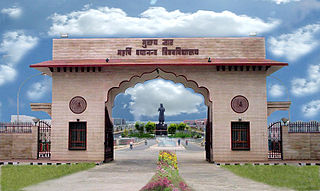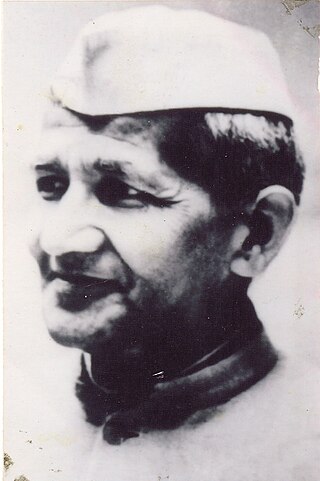
Bhupinder Singh Hooda is an Indian National Congress politician who is the current Leader of the Opposition in Haryana Legislative Assembly. He also served as the Chief Minister of Haryana from 2005 to 2014.

The Constituent Assembly of India was elected to frame the Constitution of India. It was elected by the 'Provincial Assembly'. Following India's independence from the British rule in 1947, its members served as the nation's first Parliament as the 'Provisional Parliament of India'. It was conceived and created by V. K. Krishna Menon, who first outlined its necessity in 1933 and enshrined it as a Congress demand.

Devi Lal, also known as Chaudhary Devi Lal, was an Indian statesman and politician who served as 6th Deputy Prime Minister of India from 1989 to 1990 and from 1990 to 1991. Lal emerged as farmer leader from the state of Haryana, and served as the Chief Minister of Haryana from 1977 to 1979 and then from 1987 to 1989. He was the founder of Indian National Lok Dal. He was popularly known as Tau, meaning uncle.

Bhakra Nangal Dam is a concrete gravity dam on the Satluj River in Bhakra Village in Bilaspur district, Himachal Pradesh in northern India. The dam forms the Gobind Sagar reservoir. Nangal Dam is another dam at Nangal in Punjab downstream of Bhakra Dam. However, sometimes both the dams together are called Bhakra-Nangal Dam though they are two separate dams.

Rohtak is a city and the administrative headquarters of the Rohtak district in the Indian state of Haryana. It lies 70 kilometres (43 mi) north-west of New Delhi and 250 kilometres (160 mi) south of the state capital Chandigarh on NH 9. Rohtak forms a part of the National Capital Region (NCR) which helps the city in obtaining cheap loans for infrastructure development from the NCR Planning Board.
Although India is a parliamentary democracy, the country's politics has become dynastic or with high level of nepotism, possibly due to the absence of party organizations, independent civil-society associations which mobilize support for a party, or centralized financing of elections. The dynastic phenomenon is present at the national, state, regional, and district level. The Nehru–Gandhi family has produced three Indian prime ministers, and family members have largely led the Congress party since 1978. The ruling Bharatiya Janata Party (BJP) also has several dynastic leaders. In addition to the major national parties, other national and regional parties such as Shiromani Akali Dal, Shiv Sena, Samajwadi Party, Rashtriya Janata Dal, Janata Dal Secular, Jharkhand Mukti Morcha, Dravida Munnetra Kazhagam, Kerala Congress, Jammu & Kashmir National Conference, Indian Union Muslim League, AIMIM, and the Nationalist Congress Party are all dominated by families, mostly those of the party founders.

Bansi Lal Legha was an Indian independence activist, senior Congress leader, Chief Minister of Haryana, former Defence Minister of India, and the architect of modern Haryana. Bansi Lal was part of the famous Lal trio of Haryana which also included 'Tau' Devi Lal and Bhajan Lal, that form the major Political families of Haryana.
Chaudhary is a common surname in the Indian subcontinent and Pakistan, originally derived from an Indian hereditary title. "Chaudhary" is a term adapted from the Sanskrit word caturdhara, literally "holder of four". 'Chaudhary' was first bestowed by the various rulers of the Delhi Sultanate, and the custom was continued by the breakaway Bengal Sultanate. Later, the Mughals and the Nawabs conferred the same title in great numbers. Chaudharies were "local magnates" responsible for land taxes alongside an amil and a karkun (accountant) in the local-level administrative units known as parganas.
Deepender Singh Hooda is an Indian politician and four-term MP from the Indian National Congress, who is the current Member of Parliament, Rajya Sabha representing Haryana. He also served three terms as Member of Parliament in Lok Sabha from Rohtak (2005–2019). He is a special invitee to the Congress Working Committee, the highest decision making body of the Indian National Congress.

Rao Inderjit Singh is an Indian politician and a Minister of State in the Government of India. He is also a member of the Lok Sabha, the lower house of the Indian Parliament. He represents the Gurgaon constituency in Haryana and is a member of Bharatiya Janata Party.

Bhagwat Dayal Sharma, popularly known as Panditji, was the first Chief Minister of the Indian state of Haryana and later Governor of Odisha and Madhya Pradesh from 30 April 1980 to 14 May 1984. He is one of the greatest leaders of Haryana and his legacy is celebrated even today.

Captain Abhimanyu Singh Sindhu is an Indian politician. He was cabinet minister with independent charge of eight departments in the Government of Haryana state in India in the first-ever government led by the Bharatiya Janata Party (BJP) in Haryana.

Chaudhary Birender Singh is a senior Indian political leader and a well-known face in Indian Politics. He lately served as Minister of Rural Development, Panchayati Raj, Sanitation & Drinking Water from 2014 to 2016 and later as the Union Minister of Steel from 2016 to 2019 in the Narendra Modi led NDA Government in India.
This is the alphabetical categorised list of statewide, regional and local political families involved in the politics and various elections of Haryana state of India at state and national level.
Dharampal Singh Yadav was an Indian politician.

Babu Mool Chand Jain, often referred to as "Gandhi of Haryana", - a Gandhian who was a member of the Congress Party, Vishal Haryana Party, Janata Party, Lok Dal and then Haryana Vikas Party at different times. He was a freedom fighter in the Indian independence movement, parliamentarian, lawyer, Satyagrahi social activist, and Indian statesman who also served as Excise & Taxation and Public Works Department Minister in Joint Punjab as well as Finance Minister, Deputy Chairman.

Deshbandhu Gupta, also known as Lala Deshbandhu Gupta, was an Indian freedom fighter, politician, and journalist. He served as a member of the Punjab Provincial Assembly, having won the 1937 election representing the Indian National Congress. He was also a member of the Constituent Assembly of India.
Ranbir Singh or Ranabir Singh may refer to
Harjot Singh Bains is an Indian politician of AAP from Punjab.













